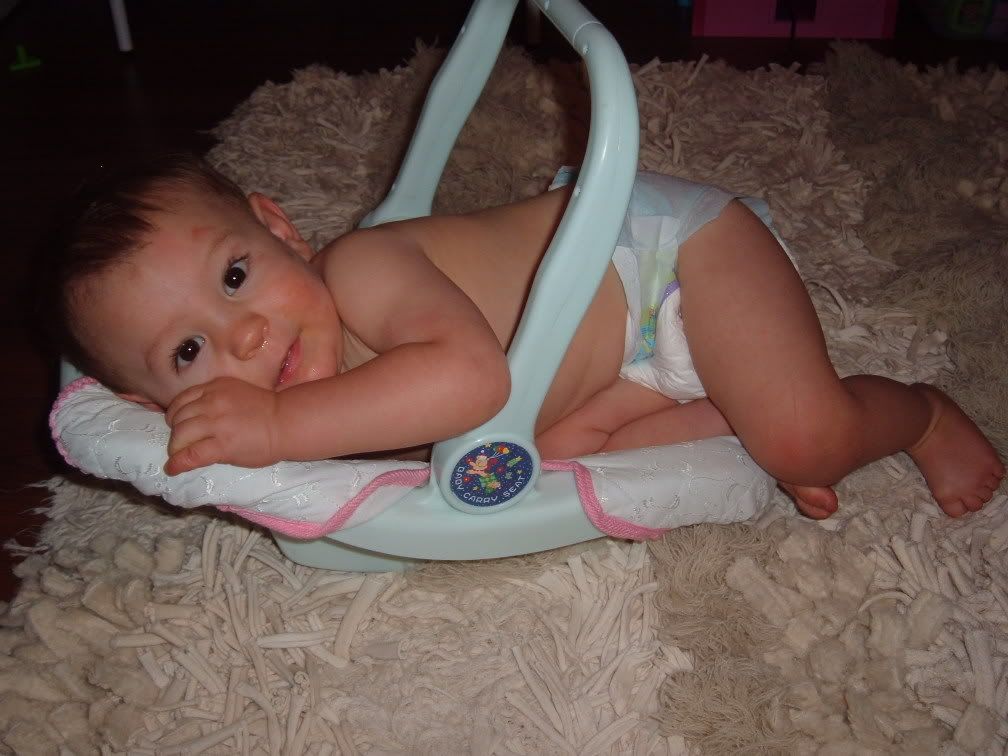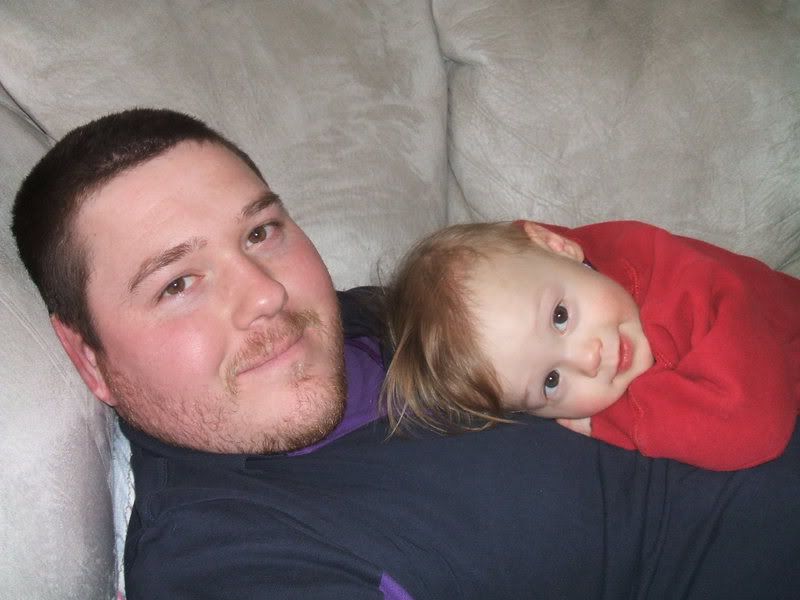Christie posted this article on the CP board and I wanted to share it here. Makes me glad that Logen is a male and we won't have to deal with menstration! I'm not really sure what I think about this. While, at first I was disguisted I started thinking about it. A child this severe will likely never have children of her own, yet that doesn't give anybody the right to take away her "parts". Then again, menstration and all of the wonderful things that come with it are frustrating- and can be scary for her. Then, there is the entire hygiene part. Wow! So much to think about!
A severely disabled teenager’s womb may be removed to improve her quality of life, and not because it is medically necessary, in what is thought to be a British first which has reignited debate over medical ethics.
Disabled charities yesterday condemned the plan while experts in the field cautioned against proceeding with such radical surgery before all other options were exhausted.
Doctors are seeking legal approval to perform a hysterectomy on Katie Thorpe, 15, in a radical solution to her mother’s fears that the girl, who has cerebral palsy, will not be able to cope with the onset of adulthood.
Alison Thorpe wants the operation to go ahead at St John’s hospital in Chelmsford to protect Katie from the “pain, discomfort and indignity” of menstruation.
Legal guidance is being sought because Katie, who cannot walk or talk and is believed to understand little of what is said to her, is unable to give consent.
News of the procedure sparked controversy yesterday, with charities denouncing the surgery, describing it as a “breach of human rights”.
Simone Aspis, of the United Kingdom’s Disabled People’s Council, said the operation was “unacceptable” when Katie could avoid menstruation through alternatives such as the Pill.
“Katie, like any other nondisabled teenager, has the right to grow up with her body intact, and where she can have the same choice as anyone else to give birth to her own children.”
She added: “We know of plenty of disabled people both with physical impairments and learning difficulties who give birth to their children and are great parents. This is nothing more than eugenics and abuse of Katie’s human rights.”
Gary Birkenhead, head of the programme development unit at Scope, the disability charity, said that while it was tough to bring up a disabled child, “that is not a reason to have to go to these lengths”.
However, Paul Hardiman, a consultant gynaecologist at the Royal Free and University College London, said the matter was not black and white. “I think you have to balance the protection of her human rights against the distress she is going to suffer if something isn’t done,” he said.
But he added that a hysterectomy was a radical and irreversible procedure that should only be considered as a last resort because less invasive options were available.
Faced with a patient in similar circumstances this year, Dr Hardiman recommended a device that releases hormones when it is inserted into the womb, slowing down or stopping menstruation. “It is as effective as sterilisation. but a key issue is that it is also reversible. A hysterectomy seems such a major and final thing to do to somebody.”
Doctors initially suggested contraceptive pills and injections to stop Katie’s periods starting but Ms Thorpe ruled them out because of the risk of her wheelchair-bound daughter suffering from thrombosis.
She said the decision to go ahead with surgery was an agonising one, but she believed it was the right one.
She told The Sunday Times: “Katie has an undignified enough life without the added indignity of menstruation. She will not understand what is happening to her body and it could be very frightening for her.
“Katie would be totally confused by menstruation. She could not manage it by herself. She could not keep it discreet; she cannot be private.”
The case echoes that of an American child known as Ashley X, who underwent surgery and hormone treatment to keep her at the size of a six-year-old child because her parents believed it would make her life more comfortable. When her case was made public in January, her parents’ argument that “keeping her small” would improve her quality of life was criticised by advocates for the disabled.
Ms Thorpe, who looks after Katie around the clock, said that her critics should “come and spend a week with me, walk in my shoes”. She said: “I’ve spent 15 years with my daughter. As a mother who loves her dearly, I am trying to do the best I can for her. I believe this is right for my daughter. It might not be the right thing for other children with cerebral palsy, and I’m not advocating that every disabled girl should have a hysterectomy, but the choice should be there.”
Disabled charities yesterday condemned the plan while experts in the field cautioned against proceeding with such radical surgery before all other options were exhausted.
Doctors are seeking legal approval to perform a hysterectomy on Katie Thorpe, 15, in a radical solution to her mother’s fears that the girl, who has cerebral palsy, will not be able to cope with the onset of adulthood.
Alison Thorpe wants the operation to go ahead at St John’s hospital in Chelmsford to protect Katie from the “pain, discomfort and indignity” of menstruation.
Legal guidance is being sought because Katie, who cannot walk or talk and is believed to understand little of what is said to her, is unable to give consent.
News of the procedure sparked controversy yesterday, with charities denouncing the surgery, describing it as a “breach of human rights”.
Simone Aspis, of the United Kingdom’s Disabled People’s Council, said the operation was “unacceptable” when Katie could avoid menstruation through alternatives such as the Pill.
“Katie, like any other nondisabled teenager, has the right to grow up with her body intact, and where she can have the same choice as anyone else to give birth to her own children.”
She added: “We know of plenty of disabled people both with physical impairments and learning difficulties who give birth to their children and are great parents. This is nothing more than eugenics and abuse of Katie’s human rights.”
Gary Birkenhead, head of the programme development unit at Scope, the disability charity, said that while it was tough to bring up a disabled child, “that is not a reason to have to go to these lengths”.
However, Paul Hardiman, a consultant gynaecologist at the Royal Free and University College London, said the matter was not black and white. “I think you have to balance the protection of her human rights against the distress she is going to suffer if something isn’t done,” he said.
But he added that a hysterectomy was a radical and irreversible procedure that should only be considered as a last resort because less invasive options were available.
Faced with a patient in similar circumstances this year, Dr Hardiman recommended a device that releases hormones when it is inserted into the womb, slowing down or stopping menstruation. “It is as effective as sterilisation. but a key issue is that it is also reversible. A hysterectomy seems such a major and final thing to do to somebody.”
Doctors initially suggested contraceptive pills and injections to stop Katie’s periods starting but Ms Thorpe ruled them out because of the risk of her wheelchair-bound daughter suffering from thrombosis.
She said the decision to go ahead with surgery was an agonising one, but she believed it was the right one.
She told The Sunday Times: “Katie has an undignified enough life without the added indignity of menstruation. She will not understand what is happening to her body and it could be very frightening for her.
“Katie would be totally confused by menstruation. She could not manage it by herself. She could not keep it discreet; she cannot be private.”
The case echoes that of an American child known as Ashley X, who underwent surgery and hormone treatment to keep her at the size of a six-year-old child because her parents believed it would make her life more comfortable. When her case was made public in January, her parents’ argument that “keeping her small” would improve her quality of life was criticised by advocates for the disabled.
Ms Thorpe, who looks after Katie around the clock, said that her critics should “come and spend a week with me, walk in my shoes”. She said: “I’ve spent 15 years with my daughter. As a mother who loves her dearly, I am trying to do the best I can for her. I believe this is right for my daughter. It might not be the right thing for other children with cerebral palsy, and I’m not advocating that every disabled girl should have a hysterectomy, but the choice should be there.”





















































No comments:
Post a Comment
Please share your thoughts.